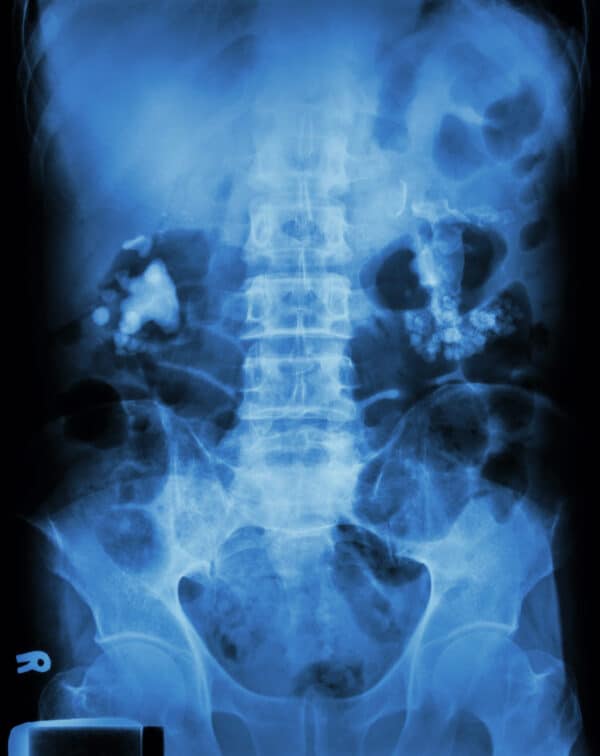
WHAT ARE KIDNEY STONES?
The kidneys act as filters in the body to remove waste products from the blood to make urine. An imbalance in waste products combined with inadequate fluid from hydration can cause the formation of a kidney stone. A kidney stone is a small, hard deposit of minerals and salts that form in the kidney. Kidney stones can be very painful when passing through the urinary tract; however, they usually do not cause any permanent damage.
Men are more likely to develop them than women and white men are most likely to be affected. Some factors that may play a role in developing kidney stones are diet, obesity and some medical conditions or chronic diseases. Certain medications and dietary supplements can increase the chance of developing them.
Kidney stones can form when urine has a higher concentration of calcium, oxalate and uric acid. The ideal environment for kidney stones to form occurs when there is not enough fluid in the urine to dilute these crystal-forming substances. There are several types of stones and knowing which type of kidney stone you have can help reduce the risk of developing more stones in the future.
Blue Ridge Urological of Fishersville, VA provides expert diagnosis and treatment for all conditions related to the urinary tract including kidney stones. Although they rarely require treatment, patients can benefit from knowing the type of stone that has formed and ways to modify the diet to avoid developing them in the future.
RISK FACTORS OF KIDNEY STONES
Certain people may have an increased risk of developing kidney stones, especially if they have a family history or personal history with them. Additional risk factors include:
- CHRONIC DEHYDRATION – if you do not take in enough fluid or lose fluid due to chronic diarrhea or malabsorption, you may have an increased risk
- OBESITY – has been linked to their development
- DIET – if your diet contains a high amount of protein, sodium or sugar, you may have an increased risk of developing them. High sodium diets increase the amount of calcium your kidneys need to filter leaving you vulnerable to an imbalance that can create an ideal environment for their development
- GASTRIC BYPASS SURGERY – having gastric bypass surgery increases the risk as it changes the absorption of certain substances like oxalate
- CHRONIC DISEASES – chronic bowel diseases such as inflammatory bowel disease which often cause chronic diarrhea affects the absorption of calcium and water
- SUPPLEMENTS AND CERTAIN PRESCRIPTION MEDICATIONS are filtered by the kidneys and can increase the risk
SYMPTOMS OF KIDNEY STONES
Kidney stones begin to cause symptoms when they move around inside the kidney or pass through the ureter, the tube that connects the kidney to the bladder. Kidney stones can become trapped in the ureter, blocking the flow of urine which can cause the kidney to swell. This can cause significant pain.
Other symptoms of kidney stones are:
As kidney stones pass through the urinary tract, the pain can change location and intensity and this indicates that the stone is moving through and may pass soon.

DIAGNOSING KIDNEY STONES
If you are currently suffering from symptoms of a kidney stone or have had them in the past, you can benefit from an appointment with a urologist. At Blue Ridge Urological, we can help determine the cause of the kidney stone, the type of kidney stone you have as well as offer some lifestyle changes that can help reduce the risk or prevent future stones. If you or your doctor suspects you have a kidney stone, there are tests that can help make an accurate diagnosis.
Testing for a kidney stone includes:
TREATMENT FOR KIDNEY STONES
Small stones do not require invasive treatment or therapy. They will usually pass over time by increasing fluid intake. As kidney stones move, they can become uncomfortable and cause pain; therefore, you can take over-the-counter pain medication to help relieve the symptoms. Your doctor may be able to prescribe a medication that will help you pass the kidney stone by relaxing the muscles of the ureter.
There are treatments available for patients who are suffering from large stones that are too large to pass without intervention and cause bleeding, kidney damage and urinary tract infections. These treatments include:
Once you have passed a kidney stone, either naturally or with intervention, it is important to determine the cause of your kidney stones so that you can adopt lifestyle changes that will help reduce the risk of developing them in the future. One of the best ways to help prevent them is to stay hydrated each day by drinking 8-12 cups of water. Modifying your diet to reduce protein, sodium and sugars can help as well.
At Blue Ridge Urological, we provide the highest standard of care for the diagnosis and treatment of kidney stones. We employ the latest and most advanced techniques and procedures available to ensure each patient is as comfortable as possible during tests and treatments. If you suspect you have a kidney stone or would like to learn more about how Blue Ridge Urological can help, call (540) 932-5926 today or schedule a consultation online.
REQUEST YOUR
